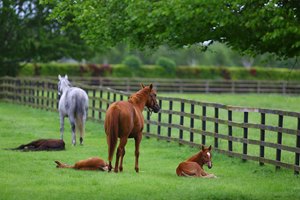Irish Stallion Farms Face Unique Challenges of COVID-19


The destructive impact of COVID-19 has brought many industries to a halt in recent weeks but Irish breeding operations are attempting to continue business to the most normal extent possible, all the while adhering to lockdown regulations.
Breeders are free to travel their mares to stallion farms for covering as it falls under the essential travel banner of farming, meaning operations like the Irish National Stud and Ballyhane Stud remain fully engaged during an especially busy period.
"Social distancing is being adhered to and people continue to be very responsible in their work," said Ballyhane's Joe Foley.
"Breeders coming in to have their mares covered stay in their mode of transport. The mare is moved from the horsebox and returned after covering, so there's none, if any risk at all, involved.
"The paperwork is faxed through as necessary and any breeders with appointments for mares are provided with a letter from ourselves.
"Any staff that don't live on site also have the relevant paperwork to travel. The ITBA has been a help with regard to the protocols."
With disruption to a wide range of sales dates over the coming months, many facets of the industry look set to face a period of uncertainty and Foley believes breeders are understandably concerned.
"It's very important that covering has been allowed to continue for the industry because we are obviously going to face economic challenges in the aftermath of the virus," he explained.
"Breeders are concerned about what the future holds for their horses, there is obviously apprehension but it's not just in the bloodstock sector—it's in all areas."
He added: "We just need to keep our heads down and hope that this can pass without leaving the worst possible trail behind.
"It's encouraging to hear the BHA making plans for racing's return, and I'm sure HRI are on the front foot in that regard also."
The Irish National Stud's breeding operation is also continuing apace but the current lockdown environment has seen the Kildare center's tourism sector take a significant hit.
In 2018, the popular facility, which is now closed, saw 127,000 paying visitors pass through their gates.
CEO Cathal Beale explained: "The tourism element of our business here has been decimated, and that's obviously an important part of everything here, but thankfully the breeding side is coping well.
"Everyone is aware of the protocols and adhering to them. Horses obviously have to be fed, foals have to be foaled, and I think it's perfectly safe once everyone does their bit to keep within the regulations that have been set."
He added: "Thankfully there has been no issue at all with any withdrawals. We're in a very busy period with two, three, or four mares foaling every night—we generally have 250 mares foaling every year.
"I have to give huge credit to the staff here who are hugely professional and have a real desire to look after these animals while always keeping to the letter of the law."
